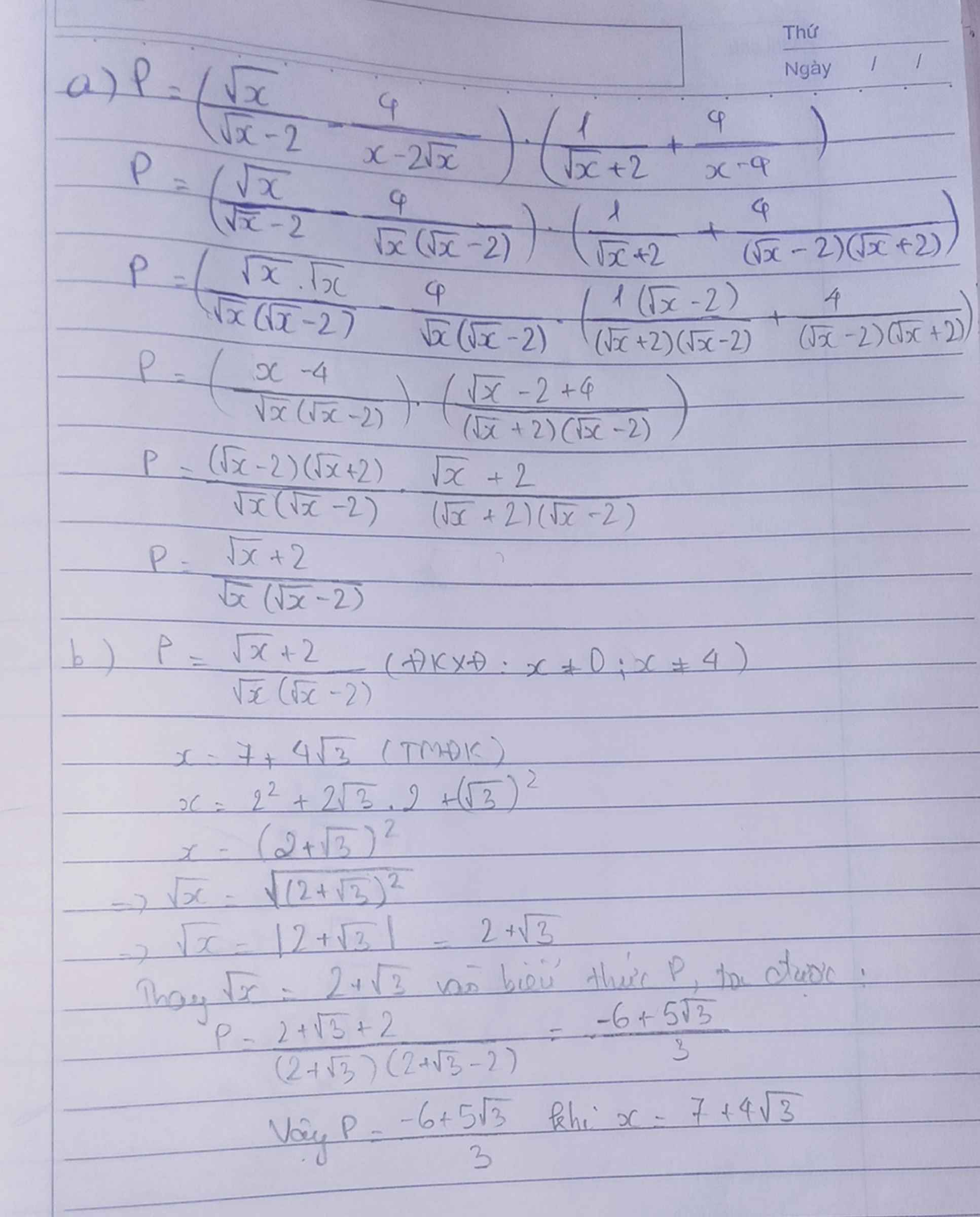Hãy nhập câu hỏi của bạn vào đây, nếu là tài khoản VIP, bạn sẽ được ưu tiên trả lời.

\(A=\dfrac{1-\sqrt{x}+x}{\sqrt{x}}\\ =\dfrac{\left(1-\sqrt{x}+x\right)\sqrt{x}}{x}\\ =\dfrac{\sqrt{x}-x+x\sqrt{x}}{x}\)
lm tiếp...

a. \(P=\left(\dfrac{\sqrt{x}}{\sqrt{x}-2}-\dfrac{4}{x-2\sqrt{x}}\right)\cdot\left(\dfrac{1}{\sqrt{x}+2}+\dfrac{4}{x-4}\right)\)
<=> \(P=\left(\dfrac{\sqrt{x}}{\sqrt{x}-2}-\dfrac{4}{\sqrt{x}\left(\sqrt{x}-2\right)}\right)\cdot\dfrac{\sqrt{x}-2+4}{\left(\sqrt{x}+2\right)\left(\sqrt{x}-2\right)}\)
<=> \(P=\dfrac{x-4}{\sqrt{x}\left(\sqrt{x}-2\right)}\cdot\dfrac{\sqrt{x}+2}{\left(\sqrt{x}+2\right)\left(\sqrt{x}-2\right)}\)
<=> \(P=\dfrac{\sqrt{x}+2}{x-2\sqrt{x}}\)
b. Khi \(x=7+4\sqrt{3}=\left(2+\sqrt{3}\right)^2\) => \(\sqrt{x}=2+\sqrt{3}\)
=> \(P=\dfrac{2+\sqrt{3}+2}{7+4\sqrt{3}-2\left(2+\sqrt{3}\right)}=\dfrac{4+\sqrt{3}}{7+4\sqrt{3}-4-2\sqrt{3}}=\dfrac{4+\sqrt{3}}{3+2\sqrt{3}}=\dfrac{5\sqrt{3}-6}{3}\)
check giùm mik

Lời giải:
ĐKXĐ: $x>0$
a. \(P=\frac{x-1}{\sqrt{x}}:\left[\frac{(\sqrt{x}-1)(\sqrt{x}+1)}{\sqrt{x}(\sqrt{x}+1)}+\frac{1-\sqrt{x}}{\sqrt{x}(\sqrt{x}+1)}\right]\)
\(=\frac{x-1}{\sqrt{x}}:\frac{x-1+1-\sqrt{x}}{\sqrt{x}(\sqrt{x}+1)}=\frac{x-1}{\sqrt{x}}:\frac{\sqrt{x}(\sqrt{x}-1)}{\sqrt{x}(\sqrt{x}+1)}=\frac{(\sqrt{x}-1)(\sqrt{x}+1)}{\sqrt{x}}.\frac{\sqrt{x}+1}{\sqrt{x}-1}\)
\(=\frac{(\sqrt{x}+1)^2}{\sqrt{x}}\)
b.
\(x=\frac{4}{4+2\sqrt{3}}=(\frac{2}{\sqrt{3}+1})^2\Rightarrow \sqrt{x}=\frac{2}{\sqrt{3}+1}\)
\(P=\frac{(\frac{2}{\sqrt{3}+1}+1)^2}{\frac{2}{\sqrt{3}+1}}=\frac{3+3\sqrt{3}}{2}\)
a: Ta có: \(P=\left(\sqrt{x}-\dfrac{1}{\sqrt{x}}\right):\left(\dfrac{\sqrt{x}-1}{\sqrt{x}}+\dfrac{1-\sqrt{x}}{x+\sqrt{x}}\right)\)
\(=\dfrac{\left(\sqrt{x}-1\right)\left(\sqrt{x}+1\right)}{\sqrt{x}}:\dfrac{x-1+1-\sqrt{x}}{\sqrt{x}\left(\sqrt{x}+1\right)}\)
\(=\dfrac{\left(\sqrt{x}-1\right)\left(\sqrt{x}+1\right)}{\sqrt{x}}\cdot\dfrac{\sqrt{x}\left(\sqrt{x}+1\right)}{\sqrt{x}\left(\sqrt{x}-1\right)}\)
\(=\dfrac{x+2\sqrt{x}+1}{\sqrt{x}}\)

\(A=\left(\dfrac{\sqrt{x}}{\sqrt{x}-1}+\dfrac{1}{x-\sqrt{x}}\right):\left(\dfrac{1}{\sqrt{x}+1}+\dfrac{2}{x-1}\right)\)
\(\Rightarrow A=\left(\dfrac{x}{\sqrt{x}\left(\sqrt{x}-1\right)}+\dfrac{1}{\sqrt{x}\left(\sqrt{x}-1\right)}\right):\left(\dfrac{\sqrt{x}-1}{\left(\sqrt{x}-1\right)\left(\sqrt{x}+1\right)}+\dfrac{2}{\left(\sqrt{x}-1\right)\left(\sqrt{x}+1\right)}\right)\)
\(\Rightarrow A=\dfrac{x+1}{\sqrt{x}\left(\sqrt{x}-1\right)}:\dfrac{\sqrt{x}-1+2}{\left(\sqrt{x}-1\right)\left(\sqrt{x}+1\right)}\)
\(\Rightarrow A=\dfrac{x+1}{\sqrt{x}\left(\sqrt{x}-1\right)}:\dfrac{\sqrt{x}+1}{\left(\sqrt{x}-1\right)\left(\sqrt{x}+1\right)}\)
\(\Rightarrow A=\dfrac{x+1}{\sqrt{x}\left(\sqrt{x}-1\right)}.\dfrac{\left(\sqrt{x}-1\right)\left(\sqrt{x}+1\right)}{\sqrt{x}+1}\)
\(\Rightarrow A=\dfrac{x+1}{\sqrt{x}}\)

a: \(A=\dfrac{-\left(\sqrt{x}-2\right)}{\sqrt{x}-1}:\dfrac{x-1-x+4}{\left(\sqrt{x}-2\right)\left(\sqrt{x}-1\right)}\)
\(=\dfrac{-\left(\sqrt{x}-2\right)^2}{3}\)
Đề bạn gõ sai, mình có sửa lại r nha
\(a,A=\dfrac{1-\sqrt{x}+1}{\sqrt{x}-1}:\dfrac{x-1-x+4}{\left(\sqrt{x}-2\right)\left(\sqrt{x}-1\right)}=\dfrac{\sqrt{x}}{\sqrt{x}-1}\cdot\dfrac{\left(\sqrt{x}-2\right)\left(\sqrt{x}-1\right)}{3}=\dfrac{\sqrt{x}\left(\sqrt{x}-2\right)}{3}\\ x=5\Leftrightarrow A=\dfrac{\sqrt{5}\left(\sqrt{5}-2\right)}{3}=\dfrac{5-2\sqrt{5}}{3}\\ c,A=-\dfrac{1}{3}\Leftrightarrow\sqrt{x}\left(\sqrt{x}-2\right)=-1\Leftrightarrow x-2\sqrt{x}+1=0\\ \Leftrightarrow\left(\sqrt{x}-1\right)^2=0\Leftrightarrow x=1\left(ktm\right)\Leftrightarrow x\in\varnothing\)

coi như giải hệ pt
\(\hept{\begin{cases}y=x+1\left(1\right)\\y^2-3y\sqrt{x}+2x=0\left(2\right)\end{cases}}\)
\(\left(2\right)\Leftrightarrow\left(y^2-3\sqrt{x}.y+\frac{9x}{4}\right)=\frac{9x}{4}-2x=\frac{x}{2}\\ \)
\(\left(y-\frac{3\sqrt{x}}{2}\right)^2=\left(\frac{\sqrt{x}}{2}\right)^2\Rightarrow\orbr{\begin{cases}y=\frac{3\sqrt{x}}{2}-\frac{\sqrt{x}}{2}=\sqrt{x}\\y=\frac{3\sqrt{x}}{2}+\frac{\sqrt{x}}{2}=2\sqrt{x}\end{cases}}\)
\(\Leftrightarrow\orbr{\begin{cases}\sqrt{x}=x+1\left(3\right)\\2\sqrt{x}=x+1\left(4\right)\end{cases}}\)
\(\left(3\right)\Leftrightarrow\orbr{\begin{cases}\left(\sqrt{x}-\frac{1}{2}\right)^2=\frac{1}{4}-1\left(vonghiem\right)\\\left(\sqrt{x}-1\right)^2=0\Rightarrow\sqrt{x}=1\Rightarrow x=1\end{cases}}\)
Vậy chỉ có điểm x=1; y=2 thỏa mãn

1
e) E >= 2021
dấu = xảy ra khi x=1/2
g) G = |x-1|+ |2-x| >= |x-1+2-x|=1
Dấu = xảy ra khi (x-1)(2-x)>=0 <=> 1<=x<=2
h) H = |x-1|+|x-2| + |x-3|
Ta có : |x-1| + |x-3| = |x-1| + |3-x| >= |x-1+3-x| = 2
|x-2| >=0
=> H>=2
Dấu = xảy ra khi (x-1)(3-x) >=0 ; x-2=0
<=> x=2
k) K = |x-1| + |2x-1|
2K = |2x-2| + |2x-1| + |2x-1|
Ta có : |2x-2| + |2x-1| = |2x-2| + |1-2x| >= |2x-2+1-2x|=1
|2x-1| >=0
Dấu = xảy ra (2x-2)(1-2x) >=0; 2x-1=0
<=> x=1/2
e)Vì \(\left|x-\dfrac{1}{2}\right|\ge0\forall x\)
\(\Leftrightarrow2\left|x-\dfrac{1}{2}\right|\ge0\forall x\\ \Rightarrow2\left|x-\dfrac{1}{2}\right|+2012\ge2012\forall x\)
Dấu "=" xảy ra khi x=\(\dfrac{1}{2}\)
Vậy...
b)G=|x-1|+ |2-x|\(\)
áp dụng bđt |a+b|+ |c+d|\(\ge\left|a+b+c+d\right|\forall x\)
\(\Rightarrow\)ta có |x-1|+ |2-x|\(\ge\) \(\left|x-1+2-x\right|\forall x\)
\(\Leftrightarrow\text{|x-1|+ |2-x| }\ge1\forall x\)
Dấu "=" xảy ra khi 1\(\le x\le2\) \(\forall x\)
Vậy...
h)H= |x-1|+|x-2| + |x-3|
Ta có |x-1| + |x-3|
=|x-1| + |3-x| ( trong giá trị tuyệt đối đổi dấu không cần đặt dấu trừ ở ngoài)
=>|x-1| + |3-x|\(\ge\left|x-1+3-x\right|\forall x\)
<=>|x-1| + |3-x|\(\ge2\forall x\) (1)
Mà |x-2|\(\ge0\forall x\) (2)
Từ (1) và (2)=> ta có |x-1|+|x-2| + |x-3| \(\ge2\forall x\)
Dấu "=" xảy ra khi x-2=0
<=>x=2
Vậy...
k) K = |x-1| + |2x-1|
2K = |2x-2| + |2x-1| + |2x-1|
Mà : |2x-2| + |2x-1|
=|2x-2| + |1-2x|\(\ge\text{|2x-2+1-2x|}\) \(\forall x\)
Lại có |2x-1| \(\ge\)0 \(\forall x\)
Dấu "=" xảy ra 2x-1=0
<=>x=\(\dfrac{1}{2}\)
Vậy....

Áp dụng BĐT Cauchy ta có:
P = \(x^2+y^2+\dfrac{33}{xy}\) \(\ge\) \(\dfrac{\left(x+y\right)^2}{2}+\dfrac{33}{x+y}\) = \(\dfrac{4^2}{2}+\dfrac{33}{4}=\dfrac{65}{4}\)
=> Dấu = xảy ra <=> \(\left\{{}\begin{matrix}x+y=4\\x=y\end{matrix}\right.\) <=> \(x=y=2\)
Vậy ...............................

\(A=\dfrac{x^2+2x+17}{2\left(x+1\right)}=\dfrac{x^2-6x+9+8x+8}{2\left(x+1\right)}\\ =\dfrac{\left(x-3\right)^2+8\left(x+1\right)}{2\left(x+1\right)}=\dfrac{\left(x-3\right)^2}{2\left(x+1\right)}+4\)
Vì \(\left(x-3\right)^2\ge0;2\left(x+1\right)>0\) (do \(x>-1\))
\(\Rightarrow\dfrac{\left(x-3\right)^2}{2\left(x+1\right)}\ge0\Leftrightarrow A=\dfrac{\left(x-3\right)^2}{2\left(x+1\right)}+4\ge4\)
Dấu "=" xảy ra khi \(x=3\)
Vậy....
bạn 8 rút gon cho 2 bằng 4 thì mất 2 còn x+1 thôi fk